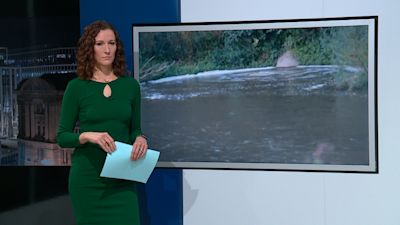Insight
'Huge chemical cocktail' of pollutants poisoning our rivers

As many of our viewers will know, for some time now ITV Central has been investigating the state of our rivers.
An investigation by us in May 2021 found some rivers in the Midlands were carrying up to 50 times the safe level of chemicals in the water. While another, which we broadcast in September, revealed that in 2020 alone, 33 years worth of sewage was dumped into the catchment area of the River Wye, which runs through Herefordshire.
Now, a report by a cross-party committee of MPs has come to the same conclusion - that there is a crisis facing England's rivers.
It found only 14% of our waterways meet 'good' ecological status, and none were classed as ‘good’ when it came to chemicals - with what it called a "huge chemical cocktail" of raw sewage, agricultural run-off, and microplastics suffocating plant, insect and fish life.
It means the government is on track to fail in its legal duty - enshrined in the Water Framework Directive requirement to bring all rivers to good status by 2027.
The main sources of pollution in rivers are:
Agricultural pollution (affecting 40% of water bodies)
Sewage and wastewater (36%)
Run-off from towns, cities and transport, referred to as urban diffuse pollution (18%)
The chair of the Environmental Audit Committee, which put together the report, is Phillip Dunne - the MP for Ludlow.
"Rivers are the arteries of nature and must be protected,” he said.
“Our inquiry has uncovered multiple failures in the monitoring, governance and enforcement on water quality. For too long, the government, regulators and the water industry have allowed a Victorian sewerage system to buckle under increasing pressure.
"Today, we are calling for these relevant bodies to come together and develop a system fit for the future. Monitoring regimes need to be reviewed, enforcement needs to be ramped up, and even public awareness needs boosting on what can and cannot be poured down drains or flushed down the toilet.
“So many emerging pollutants are being missed by inadequate and insufficient monitoring, and court actions against polluters have fallen dramatically.
"To deliver real change and improve the state of our rivers, a wide range of stakeholders must come together including the Government, regulators and water companies.”
Several serious areas for concern were raised within the report, including:
Run-off from roads pouring directly into rivers is currently not regulated.
According to the report, only 3,991 out of the 26,401 drainage points across what National Highways calls the ‘Strategic Road Network’ have measures in place to mitigate the risk of pollution to watercourses.
In the 2020/21 financial year, the organisation put in measures to mitigate risks of 23 of these points - and the report points out at that rate, it would take more than 55 years to tackle the 1,326 it has identified as ‘high risk’, let alone any others. “This is unacceptably slow progress,” the report adds.
The presence of pharmaceutical drugs and narcotics in rivers is not being systematically measured.
While wastewater treatment works remove some chemicals, they have not advanced enough to deal with all of them.
The report cites a study examining the presence of narcotics in the River Thames, which found 27 drug residues including cocaine in the water. High levels of drugs tended to coincide with occasions when sewage drains were open and pumping waste into the river.
River pollution may also present a threat in the form of antibiotic-resistant bacteria strains.
The report cites a study of UK coastal waters, which found that 11 of 97 areas - more than 10% - of waters sampled contain
E.coli resistant to antibiotics. Another study found that surfers were three times more likely than non-surfers to have antibiotic-resistant bacteria in their gut.
The report has been widely welcomed by anti-pollution campaigners.
Salmon & Trout Conservation gave detailed evidence to the committee on the impact pollution is having on species, and its chief executive Nick Measham said the report should act as a call to action.
“We have had Salmon Action Plans, we have had endless round-tables, initiatives and meetings, but what we haven’t had is the robust political commitment in Whitehall to do all it takes to protect salmon,” he said.
“We have perhaps one last chance at getting this right. We need to hear right now, from Government at the highest level, that they understand what they are being told on salmon and they will act.”
Meanwhile, conservation charity WWF told ITV Central that the report came as "no surprise" - but that it should serve as a call to urgent action from ministers.
"The UK Government has got to get its act together to clean up England's rivers, restore our freshwater habits to good health," she said.
"That means both proper enforcement of existing laws meeting those targets of 75% of our rivers being good or excellent.
"And also tackling our food and agriculture system. We've got to create a wider strategy to transform the way that we use our food and we use our land so that it's not at odds with nature."
Environment Minister Rebecca Pow said the Government welcomed the report, and said it was going "further and faster than any other government to protect and enhance the health of rivers and seas".
An Environment Agency spokesperson added: "The EA has launched a major investigation into possible unauthorised spills at thousands of sewage treatment works, secured fines of over £137 million since 2015 for pollution incidents and placed new requirements on water companies to significantly increase their monitoring and reporting so that everyone can see what is happening.
"We are also working with farmers to support environmentally friendly farming that doesn't damage water quality.
"Everyone should understand the scale of the challenges and the investment needed to put things right. We welcome the EAC's recommendations and will respond in due course."